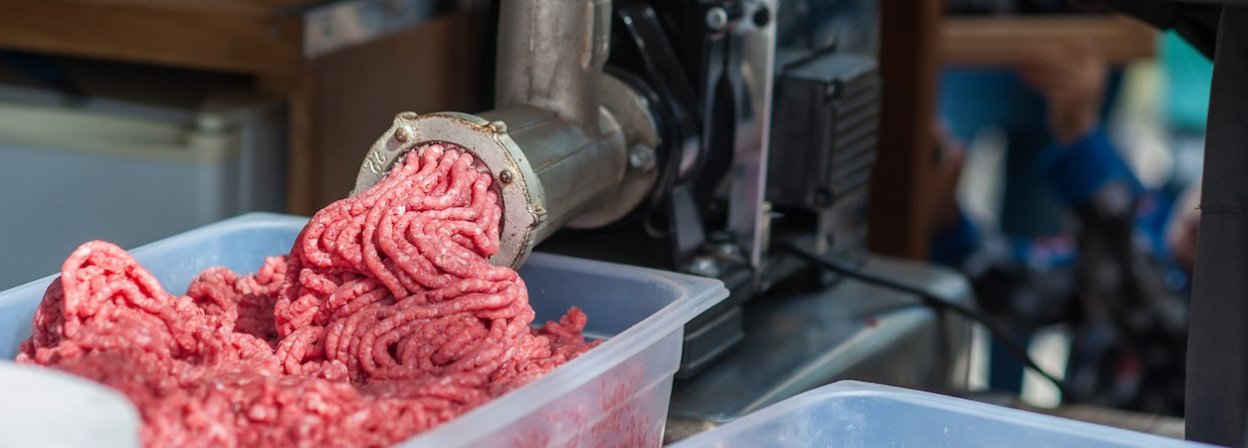
A rugged workhorse designed to meet major meat-processing needs. One of the higher-quality models available.
A rugged workhorse designed to meet major meat-processing needs. One of the higher-quality models available.
Very powerful model that delivers a 360-pound-per-hour processing rate. Stainless steel. Can grind bones and sinew. Straightforward cleanup.
At 47 pounds, it uses a lot of space. Not recommended for the dishwasher (but the stainless steel parts could survive it).

Choose this affordable meat grinder if you need a versatile option that won't take up a lot of space on a countertop or in a cabinet.
Choose this affordable meat grinder if you need a versatile option that won't take up a lot of space on a countertop or in a cabinet.
Compact design. Multifunctional, as it can be used to chop different types of food. Has dual modes and stainless steel build. Includes a rubber mat for stability during use. Decent price.
Challenging to clean, as food is prone to get stuck under the blades. Large, thick pieces of meat may challenge it. Some longevity concerns.

A comprehensive and heavy-duty meat grinder ideal for breaking down large amounts of meat.
A comprehensive and heavy-duty meat grinder ideal for breaking down large amounts of meat.
It has a 1,200-watt motor, meat claws, and a burger-slider press. There are three speed settings, including reverse, and it includes a high-capacity tray that holds over 3 pounds of meat.
Fat and bones can clog the meat grinder sometimes.

This electric grinder from a trusted brand is a step up from other household models.
This electric grinder from a trusted brand is a step up from other household models.
Grinds as much as 3 pounds of meat per minute. Features two sausage attachments, including one designed for breakfast links.
Complaints of clogging even though it features a reverse function that should keep the grinder running smoothly.

This meat grinder boasts a powerful motor and meets all safety regulations.
This meat grinder boasts a powerful motor and meets all safety regulations.
The motor's peak power can reach up to 2,600 watts, and the kit includes three cutting plates of different sizes. Thanks to a simple three-way on/off/reverse switch, it's easy to operate, and the dual blades are suitable for cutting various meats and vegetables.
It gets hot very quickly.

We recommend these products based on an intensive research process that's designed to cut through the noise and find the top products in this space. Guided by experts, we spend hours looking into the factors that matter, to bring you these selections.

Ready to buy now? Shop the best:
There is nothing like preparing your own meats at home. For certain dishes, only a meat grinder will give you the texture and consistency the grounded meat needs. A good meat grinder is a smart addition to your kitchen if you want something that will last for years to come.
When considering which meat grinder to buy, you'll have a few choices to make. Decide what type of meat grinder you want: manual or electric. There are also a few specifications like horsepower, the grinder plate material/size, and the feeding tube that will vary from model to model.
If you are looking for the best meat grinder for your kitchen, our guide is where you should start. You will learn all about the different features and considerations you need to think about before purchasing one. You'll also find a handy list of some of the meat grinders we'd recommend.

At BestReviews, our goal is simple: to bring you honest, unbiased reviews. We never accept free samples from manufacturers, which means we buy products off the shelves just like you.
We do the research, ask the experts, and survey existing customers, so you can make the most informed shopping decisions.
If you’re ready to purchase a meat grinder, check out the product list above for our top five picks.
But if you want to know more before you buy, including our expert’s tips, keep reading.
Manual meat grinders are simply designed. They have a handle crank that pulls meat through the blades. Their small size makes them easy to use, carry, and store. In general, manual meat grinders weigh less than electric models.
However, manual meat grinders made of stainless steel can weigh as much as similarly sized electric grinders. You need good muscle strength to use a manual grinder. Keep in mind the type of meat you’ll be grinding, since wild game is tougher to grind than domestic meat.
Manual meat grinders are relatively inexpensive. If you occasionally grind a small amount of domestic meat, a manual meat grinder is an excellent choice.
Electric meat grinders offer more options than their manual counterparts. Electric grinders offer exceptional speed and efficiency. Meat can be ground in half the time and effort it takes with a manual grinder. Many can handle wild game and some can grind bones as well. It also takes little physical effort to put meat through an electric grinder compared to a manual model. Sanitation is easier with an electric model, too.
Manual grinders take longer to grind meat, and when the temperature of meat rises, there is more opportunity for bacteria to grow. Electric models quickly move through large quantities of meat, decreasing the possibility of contamination.
Electric models are more expensive, and they can be heavy, especially if made of stainless steel.
The material used to make the grinder plate affects price and durability.
Carbon steel
Carbon steel grinder plates are tough and durable yet lightweight in comparison to stainless steel. The downside is they don’t last as long and can rust if not cared for properly.
Stainless steel
Stainless steel grinder plates last longer and don’t rust as easily. Though stainless steel can be placed in a dishwasher, many meat grinder manufacturers do not recommend doing so. Keep in mind that the more stainless steel components in the meat grinder, the heavier it will be. There are meat grinders made entirely of stainless steel that weigh more than 40 pounds.
Meat grinders are given a number — 5, 8, 12, 22, 32, 42, and up — that indicates the size of the grinder plate.
The size of the grinder plate greatly affects the type of meat, the piece size, and the amount of meat that can be ground. The larger the number, the larger the meat grinder and grinder plate.
A size 5 or 8 grinder plate meets the needs of those who occasionally grind domestic meat. Larger sizes are for those who do large quantities or wild game.

If you plan to grind meat a couple times a year, a meat grinder with less than .5 horsepower will work fine.
Hunters and those who process high volumes of meat should look for a grinder on the commercial scale, which starts at .5 horsepower and above.
The tray holds the meat before it is placed in the feed tube, which feeds the meat to the blades. Tray and feed tube size correspond to the grinder plate number.
Those processing wild game or who use a grinder for large quantities of meat should look for a grinder with a large tray and feed tube.
A bigger feed tube opening also means you don’t have to cut up the meat into as many pieces to fit it in the tube, saving you time in the end.
It’s important to consider what’s included in the price of a meat grinder.
Some meat grinders with hefty price tags also include three or more grinder plates and blade sizes for more versatility and use.
Extra attachments allow you to grind vegetables or make pasta. If you want to make sausage, there are sausage accessories that come with some grinders.
Inexpensive: For under $50, you’ll find many different kinds of manual meat grinders, from stainless steel models that attach to the counter to all-plastic standalones. You’ll also find meat grinding attachments that work with various types of mixers. What you won’t find at this price range is all-stainless-steel construction. You may find a grinder with a few components made of stainless steel but not throughout.
Mid-range: In the $50 to $150 range are manual meat grinders made entirely of stainless steel, along with small electric models. The manual grinders at this price range have excellent construction and durability. Small electric meat grinders at this price point have some components made of stainless steel or aluminum, but the housing is usually plastic.
Expensive: At $150 to $250 are larger grinders, size 12 and up, that come with multiple grinding plates, blades, and sausage-stuffing accessories. You’ll also find some commercial-grade grinders with some stainless steel and aluminum components.
Premium: At $250 and up, you’ll find commercial-grade meat grinders made of all-metal components, either aluminum or stainless steel. While some are as small as size 5, these grinders are high quality and durable. Many have .75 horsepower or more and can grind around 480 pounds of meat in an hour. This is where you’ll find meat grinders that weigh 40 pounds or more.
You will occasionally need to get your blades sharpened if they’ve gotten dull. Once a year or so for a moderately well-used grinder is more than enough.
At least once during the grinding process, you will need to stop and clean the grinder of fat, gristle, and skin. Be sure the grinder is unplugged first.
Only put bones through your grinder if the manual specifically states the grinder is intended for that purpose. The warranty can be voided if the grinder is used for purposes not outlined in the manual.
Make sure you have completely dried your grinder before storing it. Standing water can cause the grinder to rust.

Q. I want to feed my pet a raw diet. Are there meat grinders that can grind bones?
A. There are meat grinders that can grind bones. But you shouldn’t grind bones unless the grinder is intended for that purpose as you could void the warranty. All meat grinders that can handle bones are at least a size 12, with size 22 or 32 being ideal for grinding bones because of their larger trays and feed tubes.
Q. Do I have to cut the meat into pieces before putting it in the grinder?
A. The short answer — it depends. Size 22 or 32 grinders won’t require you to cut most meat unless you are doing wild game. Smaller sizes, like 5 and 8, will require the extra work to make the pieces small enough for the feed tube.
Q. I want to make ground meat a few times a year to make my own meatloaf and hamburger patties. What kind of grinder would work best for me?
A. Since you won’t be doing a large quantity of meat or wild game, you can use a manual meat grinder, a model that attaches to a mixer, or an inexpensive electric model. Any of these choices would meet your needs. However, consider if you have the arm strength to use a manual grinder. If not, an attachment or small electric model would be best.
Get emails you’ll love.
Learn about the products you’re wondering if you should buy and get advice on using your latest purchases.
